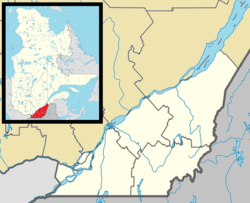Tracy Thermal Generating Station
| Tracy Thermal Generating Station | |
|---|---|

The Tracy generating station in 2006.
|
|
| Official name | Centrale thermique de Tracy |
| Country | Canada |
| Location | Sorel-Tracy, Quebec |
| Coordinates | 45°59′50″N 73°10′20″W / 45.99722°N 73.17222°WCoordinates: 45°59′50″N 73°10′20″W / 45.99722°N 73.17222°W |
| Status | Decommissioned |
| Construction began | March 1962 |
| Commission date | 1964-1968 |
| Decommission date | March 1, 2011 |
| Owner(s) | Hydro-Québec |
| Thermal power station | |
| Primary fuel | Heavy fuel oil |
| Power generation | |
| Units operational | 4 × 165 MW |
| Make and model | Parsons |
| Nameplate capacity | 660 MW |
The Tracy Thermal Generating Station is a retired 660-megawatt heavy fuel oil-fueled thermal power station built from 1962 by the Shawinigan Water & Power Company and completed by Hydro-Québec after the buyout of all private electric utilities by the government of Quebec in 1963. Commissioned between 1964 and 1968, the plant is located on the banks of the Saint Lawrence River in the city of Sorel-Tracy, in the Montérégie Region.
Mainly used as a peaker plant, the Tracy facility was usually running during cold spells in the winter. It was sometimes operated year-round to supplement hydroelectric generation during low-water years.
Although it was operated only sporadically, the generating station has been criticized for its contribution to air pollution as it was one of Quebec's major sources of carbon dioxide (CO
2), sulfur dioxide (SO
2), nitrogen oxides (NO
x) and particulates (PM). Some commentators have accused Hydro-Québec of unnecessarily operating the Tracy thermal plant to export electricity by taking advantage of low fuel prices at certain times.
...
Wikipedia

